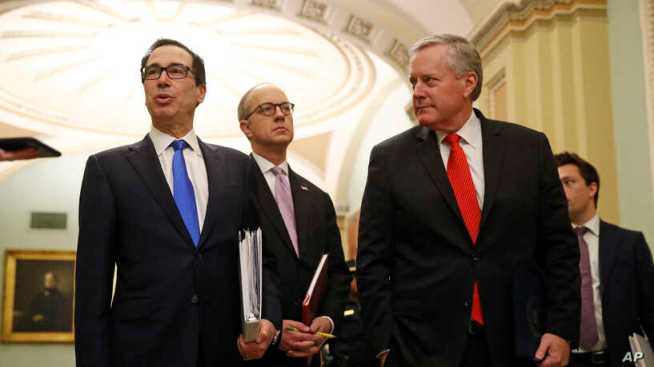Declaración del Representante Magaziner sobre su visita al Centro de Detención Wyatt

APTOPIX Virus Outbreak Congress
US Senate to Vote on Coronavirus Rescue Aid
VOA News By Ken Bredemeier, Chris Hannas Updated March 25, 2020 03:30 PM
The U.S. Senate is set Wednesday to vote on a $2 trillion economic rescue package, the biggest in American history, to help businesses and most families cope with the economic plight wrought by the coronavirus crisis.
The White House and top congressional leaders reached agreement on the aid in the early hours of Wednesday after days of contentious negotiations.
Assuming Senate passage, the measure would then go to the House of Representatives for a vote. But the House is currently out of session, so approval in the chamber would either have to come from “unanimous consent,” with all lawmakers agreeing to its passage, or lawmakers returning to Washington to vote in the coming days.
“In effect, this is a wartime level of investment into our nation,” Senate Majority Leader Mitch McConnell said. “Help is on the way.”

Senate Democratic Leader Chuck Schumer called the aid agreement “far from perfect,” but urged its quick passage.
President Donald Trump’s chief negotiator on the package, Treasury Secretary Steven Mnuchin, said the U.S. leader would “absolutely” sign it into law once congressional action is completed.
«We have a bipartisan agreement on the largest rescue package in American history,» Schumer said. «This is not a moment of celebration, but one of necessity.»
Even so, there might be further roadblocks on the path to Senate passage of the legislation. Three Republican lawmakers spotted a “drafting error” they said would give workers an incentive to ask to be laid off because the jobless payments envisioned in the aid package would boost their income beyond the amount they were earning while employed.
New York Gov. Andrew Cuomo said the funding allocation for his state — $3.8 billion — was woefully short of what New York needs to treat the sharply increasing number of coronavirus patients.
Among other provisions, the measure provides $500 billion in assistance to the hardest- hit major U.S. companies, another $367 billion to small businesses with fewer than 500 employees, and $250 billion to bolster state-run unemployment compensation funds, as the ranks of the jobless have ballooned in the last two weeks.
Two weeks ago, 281,000 workers made new jobless compensation claims. But economists, ahead of the government’s official tally on Thursday, say they believe more than 2 million filed for assistance last week.
Another major plank of the aid package is aimed at helping most American families, with the government set to send about $3,400 to families of four — a mother, father and two children. The payouts could cover about 90% of U.S. households. But officials said they do not expect to start sending the checks out until May.
Individual taxpayers would get $1,200, and couples $2,400, with aid ending for individuals earning more than $99,000 annually and $198,000 a year for couples.
“This legislation is urgently needed to bolster the economy, provide cash injections and liquidity, and stabilize financial markets to get us through a difficult and challenging period in the economy facing us right now,” said Larry Kudlow, Trump’s top economic adviser. “But also, to position us for what I think can be an economic rebound later this year.”
Trump, who was consulted frequently by top lawmakers and Mnuchin as the aid package evolved in recent days, will not, according to Schumer, be able to benefit financially from the agreement.
Trump, a billionaire with vast hotel, golf resorts and office holdings that have been sharply impacted by the global pandemic, was specifically written out of the coming business payouts. So, too, were his family, top government officials and all 538 members of Congress.

Schumer said “any major figure in government” will not be able to benefit from the rescue package,
“That makes sense,” he told CNN. “Those of us who write the law shouldn’t benefit from the law.”
McConnell described the measure as good news for doctors and nurses in the U.S. who need more funding and protective equipment, such as masks, to care for coronavirus patients.
Trump says he wants to restart the U.S. economy as quickly as possible, as lockdown orders in many states have kept workers home and closed such businesses as restaurants, bars and movie theaters, as well as factories employing thousands of workers.
On Tuesday, he said he hopes the country is “raring to go” by Easter Sunday, April 12. But medical experts have voiced skepticism, with the number of confirmed coronavirus cases and deaths rising by the hour.
The United States has about 55,000 confirmed coronavirus cases with more than 700 deaths.

